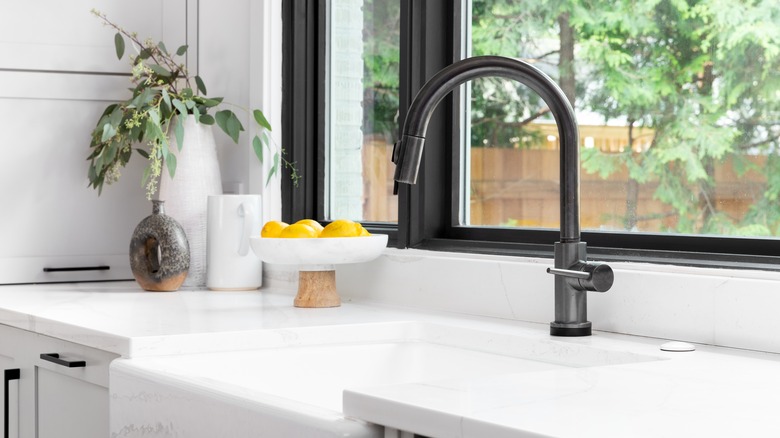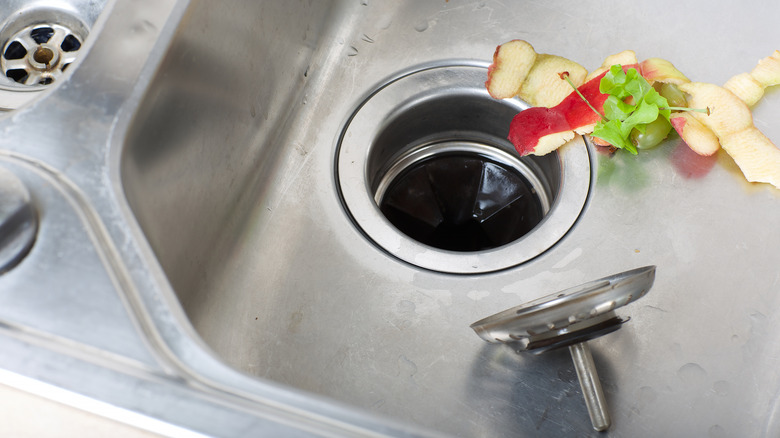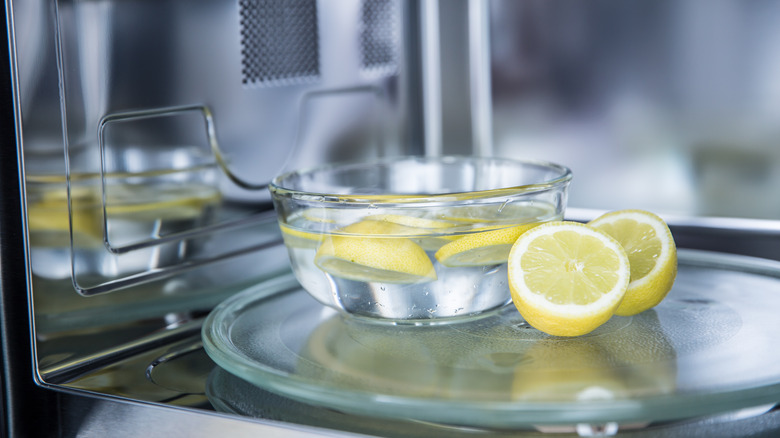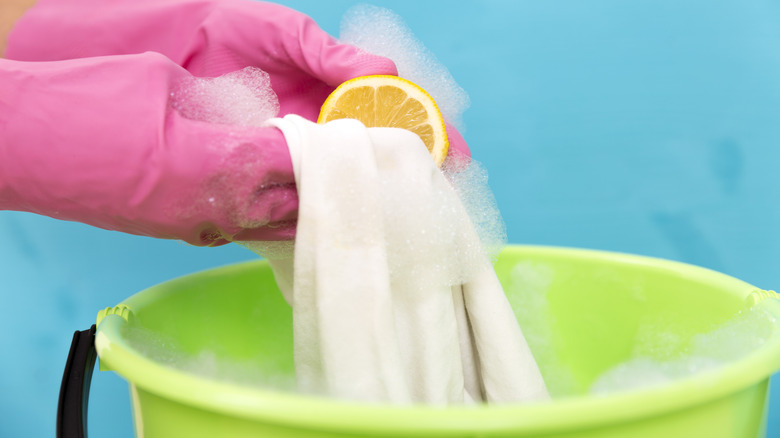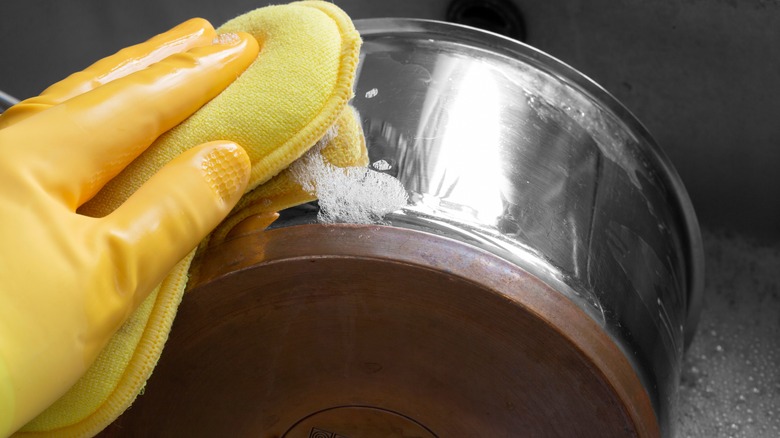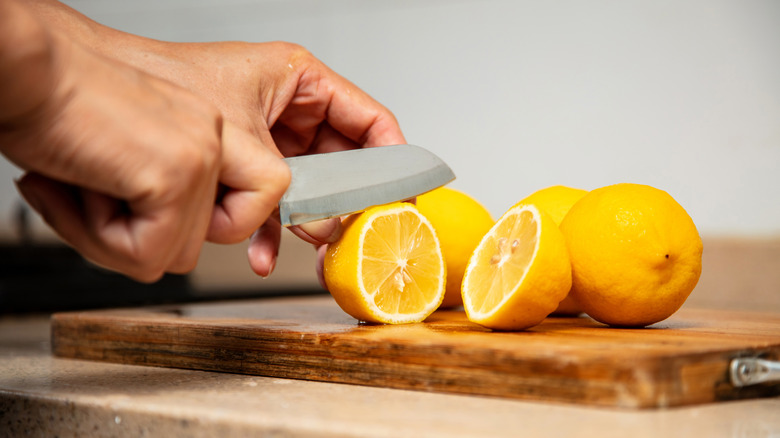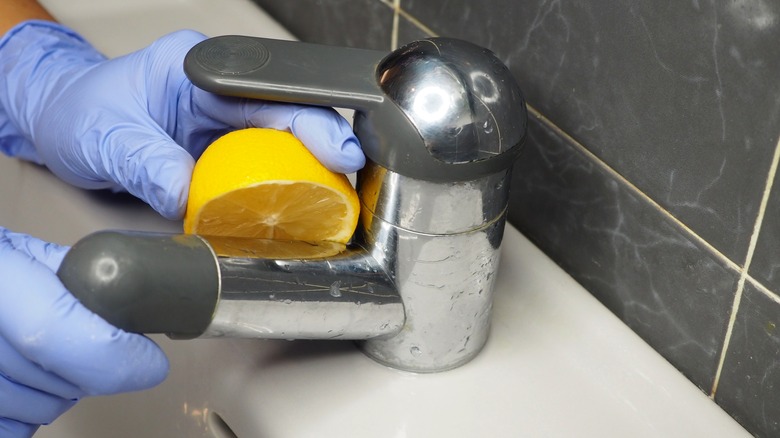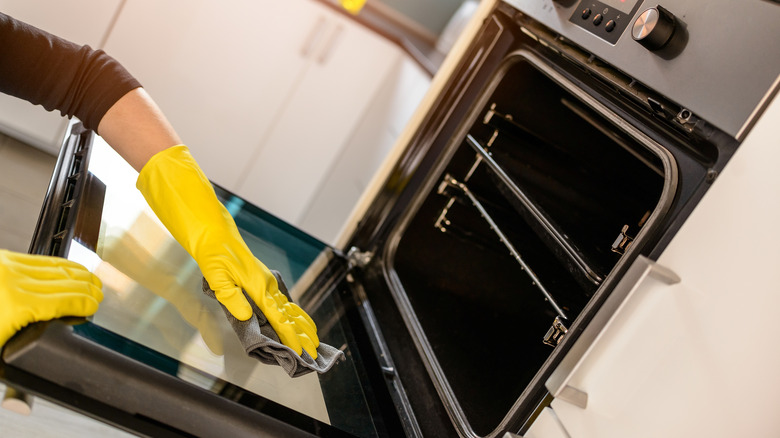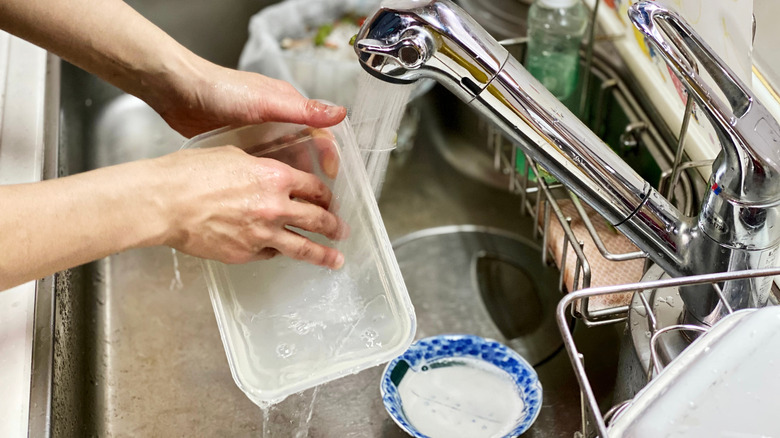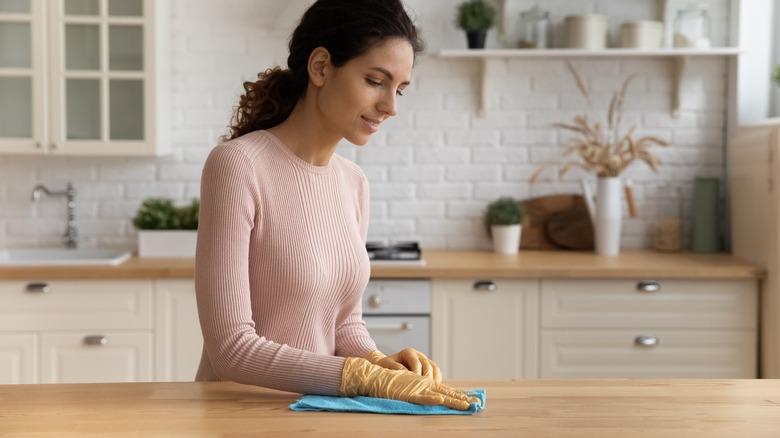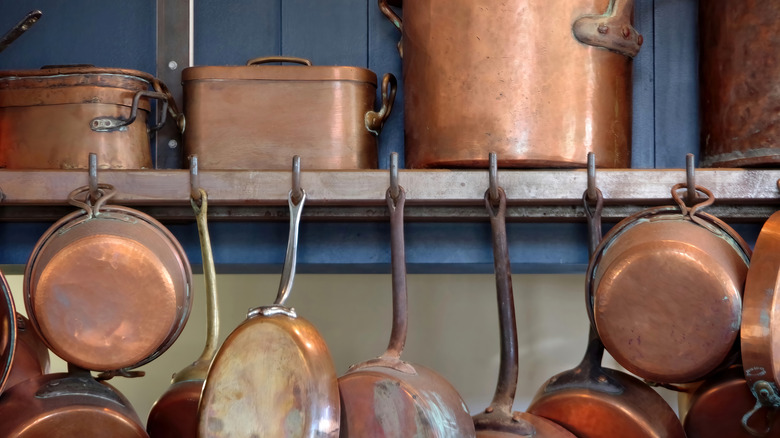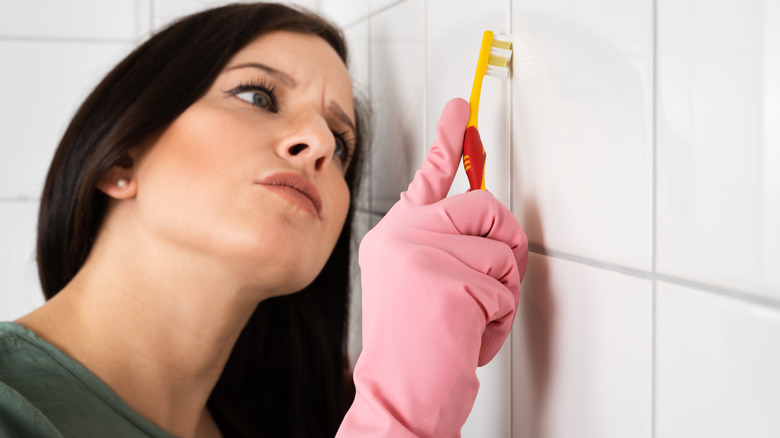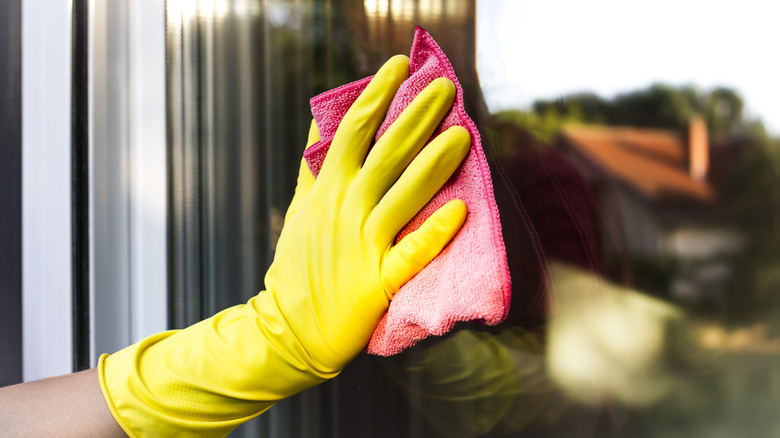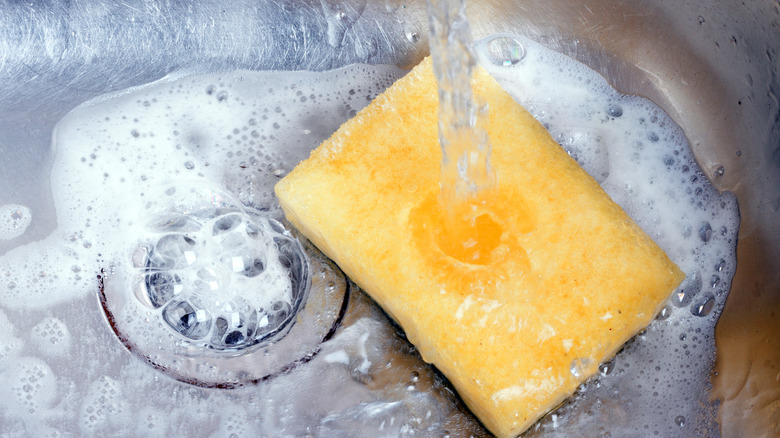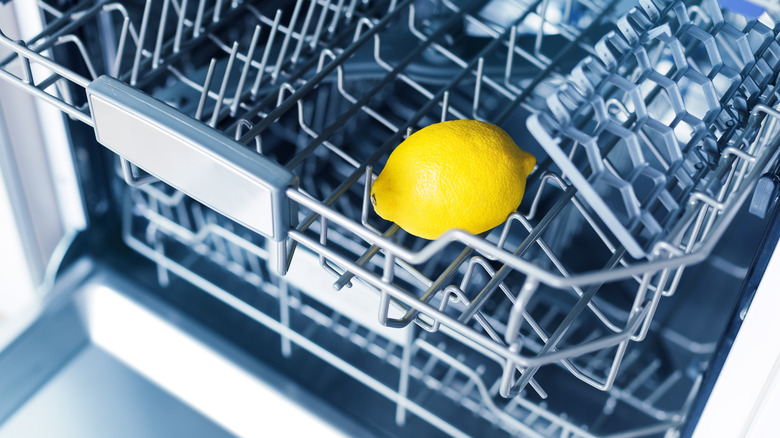14 Unexpected Ways You Can Use Lemons For A Spotlessly Clean Kitchen
Everyone wants a clean, spotless kitchen, and a lemon can be the key to helping you achieve this. While it's common to head to your cache of chemical-based kitchen cleaners to tackle tough jobs, lemons are also a natural, potent cleaning solution. Harnessing this power and adding lemons to your kitchen cleaning arsenal allows you to use an eco-friendly, safer alternative.
From removing hard water stains to making your old copper pans shine like new, lemons have an array of uses without the harsh side effects some commercial cleaners bring. However, understanding why lemon-based cleaning methods work is critical, and doing so will allow you to leverage lemons' natural cleaning properties, instead of just mindlessly replacing one cleaner with another. Figuring out all of the unexpected ways lemons can help you get that spotless clean you want in your kitchen is practical, while giving you a deeper appreciation for the yellow, citrus fruit. You can use these diverse methods to get a clean kitchen that smells refreshing.
Freshen the garbage disposal
To remove gunk and freshen your garbage disposal, gather lemon peels. Drop them into the garbage disposal unit, closely followed by a handful of ice cubes. Run cold water to prime the garbage disposal and turn it on. Allow it to run for at least 30 seconds to a minute to grind the ice and lemon peels. Switch the disposal off and leave it for five to 10 minutes before rinsing any residue away with cool water. For this process, avoid putting large chunks or whole lemons into the disposal, as this can cause clogs.
Lemon peels and ice cubes effectively freshen garbage disposal because lemons contain citric acid. This acid is a powerful cleaning agent that breaks down residue and deodorizes. As the disposal grinds the peels, they release the acid and coat the blades and the inside of the disposal to sanitize and deodorize it. The ice cubes dislodge stuck-on food particles or gunk that clings to the blades and walls. As the blades crush the ice, it gives a mild scrubbing effect that physically removes buildup for an eco-friendly, effective cleaning method.
Clean the microwave
To clean your microwave, squeeze the juice of one lemon into a microwave-safe bowl and add a cup of water. For more potency, add the squeezed lemon halves to the water as well. Microwave this lemon and water mixture for five minutes on high to create a lemon-infused steam. Leave the door shut for two to three minutes after the timer goes off to give the steam more time to loosen the grime. Carefully remove the bowl of hot water and wipe down the inside of the microwave with a damp sponge or cloth. The stuck-on food should come away easily, without having to scrub. However, be very careful when you remove the bowl, because the water inside is hot enough to burn you if it splashes out.
The citric acid content in lemons acts like a mild natural degreaser that breaks down food residue and oils. As the lemon and water heat up, they evaporate into a steam that condenses on the microwave's interior. The steam contains the citric acid from the lemon juice. As the steam cools, it loosens the grime and makes it easier to wipe away. Also, lemon's natural acidity is a mild disinfectant that kills some bacteria strains and leaves a fresh scent. The microwave's high temperature also helps kill bacteria and germs.
Brighten white dish towels and rags
To brighten your rags and dish towels, substitute your usual bleach in the wash cycle with a 1/4 to 1/2 cup of lemon juice. Use the lemon juice in your laundry, particularly on polyester or cotton fabric for the best results. Lemon's natural bleaching properties are the key to brightening your white dish towels and rags. It's also a natural disinfectant that leaves your items with a citrus scent. Professional cleaning expert Bret Jackson told Homes & Gardens, "'The fresh scent of lemon juice will leave your laundry smelling clean and fresh. It is also a natural bleaching agent, so it can help to brighten your laundry." He continued, "Adding a bit of lemon juice to your laundry will help your clothes stay bright and clean."
The citric acid breaks down and removes stains and dullness from white fabric to restore the look of your kitchen linens without using harsh chemicals. Opting for lemon juice as a whitening agent in your laundry routine, when possible, is a safer, environmentally friendly alternative that benefits your household linens and the planet.
Clean some stainless steel surfaces and items
To clean and remove rust from stainless steel surfaces, like pans, pots, and sinks, start by cutting a lemon in half. Dip the cut side into fine salt and gently rub it over the stainless steel surface. The salt is a mild abrasive that will lift the residues and dirt, and you'll finish by using a soft cloth to buff the surface to remove any leftover salt and lemon. However, be aware that this is effective for items where you're not worried about minor scratches, and therefore you should avoid using it on surfaces like stainless steel countertops and refrigerators. Even if it's a fine grain, the salt can cause microscopic scratches.
Lemon juice's citric acid helps dissolve grease, stains, and surface buildup as you rub it on. The acid breaks down grime, making it easier to buff away and make your metal shine. The fine salt is a natural abrasive that scrubs away water spots and surface stains, cleaning and polishing it. Unlike conventional cleaners that may contain harsh chemicals, salt and lemon are safe to use around areas where you prepare food. Lemons also have mild antimicrobial properties to help sanitize the surface as they clean.
Deodorize the refrigerator
Cut a few lemons into thin slices, sprinkle both sides lightly with a fine table salt and baking soda and put them on a plate in your refrigerator to deodorize it and keep it smelling fresh. For more coverage, split the lemon pieces into small bowls and put them on different shelves. The salt, lemon, and baking soda mixture absorb and neutralizes unwanted odors, making it easier to keep your refrigerator smelling fresh. Replace the lemon peels every week, or as needed, based on your refrigerator's size and condition. Also, remember that there's no concrete scientific evidence supporting how effective this actually is, but leading appliance companies like Electrolux Appliances and KitchenAid recommend it.
Lemon juice, with its high citric acid content, naturally absorbs odors and masks unpleasant smells with a bright citrus smell. Baking soda (sodium bicarbonate) is a well-documented deodorizer that neutralizes pH levels to absorb and remove odors, instead of masking them. When you combine lemon and baking soda with salt, salt is a catalyst that enhances the odor-neutralizing properties. Salt also introduces mild antibacterial properties to keep your refrigerator cleaner. These three ingredients form a powerful trio against the common culprits of fridge odors, offering a simple, eco-friendly solution to keep your refrigerator smelling clean and fresh without resorting to chemical deodorizer.
Remove hard water stains
Cut a lemon in half and rub it onto any hard water stains on your faucets or shower heads. Lemons are powerful enough to break down the water stains, without damaging the fixtures. For areas with larger stains or bigger surfaces, squeeze lemon juice onto the stain and give it a few minutes to work its magic before scrubbing lightly with a cloth or soft brush. This method is helpful to get rid of limescale and other mineral build-ups in houses with hard water. You may need to repeat this process several times to lift more set-in stains.
The citric acid lemon contains is a natural chelating agent, and this means it binds with the minerals hard water has, including magnesium and calcium, that cause the stains. Once the citric acid breaks them down, they're easier to rinse away with water. It removes the water stains and stops them from forming a hard crust. Additionally, lemon's natural origins ensure that you're not introducing any toxic substances into your home, making it a safe choice for families and pets.
Clean grease and grime from the oven
Tackle grease and grime in your oven with lemons, especially for spots on the glass door. Start by putting a pot or oven-safe bowl of water and lemon juice inside the oven and heat it for 20 to 30 minutes to steam the interior and loosen the grime. In the meantime, cut a lemon in half. Once the oven cools, rub the lemon over the surfaces. Since the grime is loose, the citric acid is more efficient at scrubbing it away. Rub the lemon halves in circular motions or directly onto any greasy spots you see, squeezing out more juice as needed. This method works well for addressing stubborn grease spots instead of cleaning the whole oven's interior, as it would be quite time-consuming.
The mild acid lemons contain work to break down and dissolve the grease stains or greasy residue on the oven's interior. Once it breaks down, the grease is easier to wipe away without needing a chemical-based degreaser. You may have to take a few passes with a damp, clean cloth to get rid of all the grease, and the cloth should be warm, so the grease doesn't solidify and streak. This option helps you avoid the health risks associated with commercial-grade oven cleaners, which can have toxic substances that can linger if you don't rinse the oven thoroughly.
Refresh your plastic containers
Do you have stubborn stains on your plastic containers or Tupperware? To save your stained containers, cut a lemon in half and rub the cut side directly on the stained spot. Sprinkle baking soda onto the container to deodorize it after you scrub. Another option is to soak the container in a few tablespoons of lemon juice and warm water. For soaking, you'll submerge the containers in the lemon water for two to three hours for light stains, and overnight for deep-set stains. Rinse the containers and dry them to finish. This will lift stains and eliminate lingering odors, leaving your plastic containers refreshed. However, note that lemon juice may not be strong enough to remove some extra stubborn stains, and you may need additional cleaning agents.
The natural acid in lemon juice is a strong organic solvent that breaks down food residue, grease, and other substances that trap smells or stain your plastic containers. The acid gets into the porous plastic to lift stains and neutralize the odors by changing the pH. If you sprinkle on baking soda, this is how it deodorizes as well. The acidity is mild enough to clean without damaging the plastic. This method is environmentally-friendly and avoids harsh chemical.
Remove grease stains from kitchen surfaces
To strip grease stains from your kitchen surfaces, squeeze fresh lemon juice onto the stained spots. Give the lemon juice a few minutes to sit on the grease stains, penetrate them, and lift them. Take a damp sponge or cloth and gently scrub the treated area, using circular motions. Physically scrubbing and lemon juice will pull the stains from the surface. Once you're happy with the results, wipe the area with a wet cloth to remove the lemon residue and dry it with a soft towel. Another option is to mix 4 cups of water, 1 teaspoon of Borax, 1 teaspoon of liquid dish soap, and some lemon in a spray bottle and spritz it onto the stains. However, while lemon juice is safe on various surfaces, avoid using it on natural stone, like marble, as it can cause etching. If unsure, test a small spot before treating a large area.
When you apply lemon juice to the grease stains, the citric acid dissolves the grease to make it easier to wipe away. As a natural, food-safe ingredient, lemon juice is ideal in the kitchen or around areas where you prepare food. It leaves a pleasant scent and doesn't contaminate your surfaces with harmful residues. There are mild antibacterial properties in lemon cleaners, which can also wipe out germs and bacteria.
Clean your copper pans
Lemon juice and salt allow you to get clean and sparkling copper pans. Slice a lemon in half, sprinkle a generous amount of salt onto the cut side, and press it against the copper surface. Scrub in circular motions, focusing on areas that show discoloration or tarnish. The salt is a mild abrasive that removes grime and tarnish without scratching the copper surface. To finish, rinse the pans under warm water and towel dry. This cleaning method removes grime and polishes your copper to give it a nice shine. However, make sure you thoroughly rinse them when you finish cleaning to strip away any salt residue because leaving salt on your copper could cause corrosion and blue-green coloring.
Cornell University recommends using lemon juice to clean copper because citric acid is a natural brightener for copper. It reacts with copper oxide (tarnish) found on the pan's surface to dissolve it to give you shiny, clean copper. Salt has a granular texture that gives you that scrubbing action you're looking for. By combining these two kitchen staples, you can maintain the beauty and functionality of your copper cookware without resorting to harsh, potentially toxic, cleaning products.
Brighten kitchen grout and lighten stains
To brighten kitchen grout and lighten stained spots, combine lemon juice with cream of tartar or baking soda to create a thick paste that'll stick to vertical surfaces without running down the wall. Apply a generous amount to the grout lines, thoroughly covering any stained areas. Leave the paste for 10 to 15 minutes to give the ingredients time to penetrate and lift the stains. Scrub the grout lines after time with a stiff-bristled brush to dislodge any grime or dirt the paste loosened. Rinse the grout with clean water to remove residue. This cleaning method works well for routine maintenance and addressing recent spills or lighter stains. It may not yield the desired results for deeply ingrained, old grout stains.
Lemon juice is a natural bleaching agent that will lighten the stains and brighten your grout's appearance. Baking soda or cream of tartar work as gentle abrasives, helping you physically remove the grime or buildup without causing damage. When you mix the baking soda and lemon juice, the short fizzing action also helps pull stains from the grout's porous surface, giving you a non-toxic alternative to chemical bleach. Additionally, lemon juice's natural acidity can help kill mildew and mold spores, contributing to a cleaner kitchen.
Clean glass surfaces
Mix equal parts lemon juice and water in a spray bottle to clean your windows, or you can try 1 cup of water with 2 tablespoons of lemon juice and 1 tablespoon of white vinegar. Shake and spray the solution directly onto windows, mirrors, tables, or glass stovetops, covering them evenly. Get a lint-free, clean cloth and wipe the glass using a circular motion, then switch to horizontal strokes, ensuring you cover the whole surface. For bigger areas, clean in sections to avoid missing any spots. Also, avoid using this mixture on surfaces in direct sunlight. The sun's heat can dry the mix too quickly, leaving streaks. Clean on a cloudy day or wait until the surface is in the shade for the best results.
The citric acid cuts through the grease and grime on the windows, and mixing it with water creates a solution that dissolves dirt and fingerprints without leaving a chemical residue. This mixture breaks down the substances to make it easy to wipe them away, and the water is a carrier for the lemon juice, ensuring you get a streak-free surface. Also, the pleasant citrus scent of lemon can't be beat.
Sanitize your kitchen sponges
Mix one part lemon juice with four parts water in a bowl big enough to submerge your kitchen sponges. Place them in the mixture and let them sit overnight to allow them to clean and deodorize. Rinse the sponges under running water the following day to remove any residue. However, while soaking sponges in lemon juice can remove some germs and bacteria, and is a great way to use excess lemons, it's not as effective as using a dishwasher or microwave to disinfect. To sanitize them as much as possible, consider popping them into the microwave for a few minutes or the dishwasher for a cycle, as the hot temperatures and water sanitize better, especially if the sponges come into contact with high-risk things, like raw meat.
Soaking sponges in lemon juice is semi-effective for eliminating bacteria, germs, and odors due to the citric acid content. It has mild antiseptic and antibacterial properties that kill some surface-level germs. The acid disrupts the bacteria's cell membranes, reducing how much is on the sponges. And, of course, lemon's fresh scent acts like a natural deodorizer.
Freshen your dishwasher
Adding a lemon or lemon peel to your dishwasher is a great way to refresh the interior. Run your dishwasher on a regular cycle, loading it with the usual detergents. The hot water and detergents will help spread the lemon's oils throughout the dishwasher. The lemon or lemon peel should be fresh, and you want to replace it every few loads to keep it effective, because the sanitizing and deodorizing capabilities diminish with repeated use. P.C. Richard & Son recommends putting a cup of lemon juice and running a hot water cycle instead; both options work to clean and sanitize your dishwasher.
The lemon's essential oils and citric acid content are the keys to this being an effective deodorizer and cleaner. Lemons have a stronger citrus scent that can neutralize unpleasant odors inside the dishwasher, and citric acid is a natural cleaning agent. As the dishwasher runs, the citric acid will break down food residue and soap scum, making it cleaner. The natural antibacterial and antifungal properties help sanitize the dishwasher, too.
